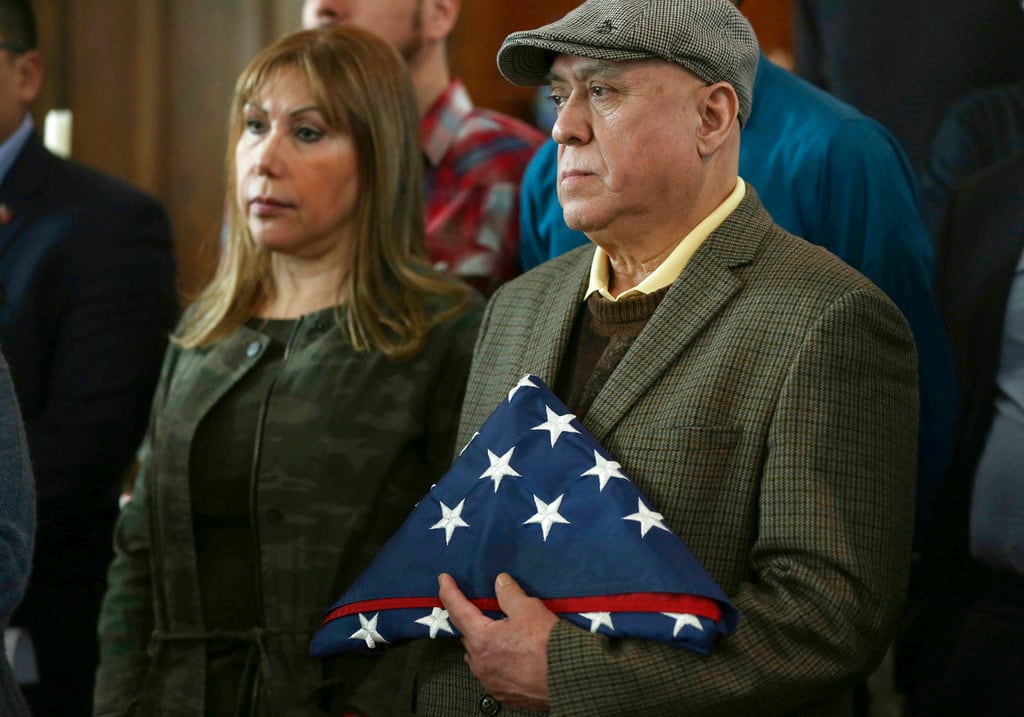WASHINGTON — President Donald Trump is ordering U.S. troops to the southern U.S. border, but the move does not appear to be as unusual as the White House first billed it this week.
The Pentagon and White House on Wednesday walked back President Donald Trump promise to handle border security “militarily,” saying the proposed moves will be restricted to National Guard personnel and be similar to past operations in Southern states.
Department of Homeland Security Secretary Kirstjen Nielsen said Wednesday at a White House press conference that her agency and the Pentagon are coordinating with governors on the specifics of the deployments, with exact numbers and missions to be announced later. Guardsmen will serve in support roles, and not actual law enforcement activities.
The announcement came roughly 24 hours after Trump announced at a similar event that “we’re going to be guarding our border with the military,” adding “we really haven’t done that before.”
RELATED

The comments drew questions and concerns about the commander in chief overstepping traditional military limits.
“A lot of folks were envisioning a line of active-duty troops and tanks on the border after Trump’s first comments,” said Todd Weiler, a former senior Pentagon official during Obama’s tenure.
“What we’ll probably end up seeing is some vehicles and aerial assets supporting the border patrol, which is normal.”
Weiler credited Defense Secretary Jim Mattis — who was silent beside Trump when he made his Tuesday comments — for helping “calm” the situation
“It’s good that we have folks in the Pentagon who are quick to react and use the ‘what the president meant to say’ line,” he said.
In recent days, Trump has floated the idea of having the military pay for a controversial border wall with part of its $700 billion fiscal 2018 defense budget, a suggestion that raised similar problematic issues of military readiness and responsibilities.
Nielsen on Wednesday emphasized the deployments would be similar to actions taken under former presidents Barack Obama and George W. Bush. Duties will include aerial surveillance work and infrastructure support.
She said she anticipates the moves will happen as soon as possible.

If the Guard is deployed as it has been in the past, there would be little those troops could do to stop crime along the border, said William Banks, author of “Soldiers on the Home Front: The Domestic Role of the American Military” and director at the Institute for National Security and Counterterrorism at Syracuse University’s College of Law.
The Posse Comitatus Act prevents the federal government from using federal troops to conduct local law enforcement on U.S. soil. Banks called it the backbone of colonists’ grievances when the United States declared independence from England.
“The phrase is known by every Private 1st Class in the U.S. military,” Banks said.
It’s also why National Guard forces are under state control, Banks said. The president could federalize the National Guard in an extreme situation, such as when Bush requested that the Guard forces responding to Hurricane Katrina be placed under federal control.
But even then, guardsmen would not have the authority to participate in law enforcement, such as preventing an illegal crossing or conducting a drug interdiction, he said.
There are exceptions, Banks said. Title 32 of the Code of Federal Regulations, section 185.4 provides National Guard troops “immediate response authority” — the ability to defend themselves if they are under immediate threat.
There is also a broader, short-term “emergency authority,” which allows the forces to take control “in extraordinary emergency circumstances where prior authorization by the president is impossible and duly constituted local authorities are unable to control the situation, to engage temporarily in activities that are necessary to quell large-scale, unexpected civil disturbances.”
Nielsen said none of those issues are under consideration at the moment. Federal departments are coordinating with all of the border state governors on the steps ahead, and administration officials are optimistic they will have full support from local leaders.
“Border security is homeland security, which is national security,” she said. “It’s not a partisan issue. It’s not something we can separate out. It’s core to being a sovereign nation.”
California officials have already publicly expressed resistance to the plan.
Trump has said he’s turning to the military for help with immigration enforcement because of congressional Democrats’ opposition to funding his proposed border wall. That issue is unlikely to be resolved in coming months, given the current fractured political environment on Capitol Hill.
Leo covers Congress, Veterans Affairs and the White House for Military Times. He has covered Washington, D.C. since 2004, focusing on military personnel and veterans policies. His work has earned numerous honors, including a 2009 Polk award, a 2010 National Headliner Award, the IAVA Leadership in Journalism award and the VFW News Media award.
Tara Copp is a Pentagon correspondent for the Associated Press. She was previously Pentagon bureau chief for Sightline Media Group.




